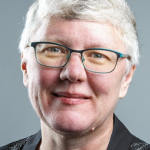
Workshop: teaching neural machine translation to translators
Teaching neural machine translation to translators
Translation technology has been part of translator training for many years now, with online resources and computer-aided translation tools playing a central role in many training programmes. Machine translation was traditionally excluded from the toolkit offered in these settings, but neural machine translation (NMT) has been pushing its way into professional practice, as a producer of content that translators need to post-edit. This has forced a transformation in translation research and in translator teaching design. Including practice on post-editing machine translation content is a necessary step towards preparing students to what the market will require from them, but can their autonomy in that market be achieved if they do not understand how NMT works, what it can offer to users and the risks it may bring?
This workshop can start from the following premises: you can have target content fed to your translation editor tool by linking it to a (free or paid) provider of NMT content; furthermore, you can train an NMT system by simply copying 3 lines of code. These two scenarios already enable the practice of post-editing in the class, and allow for analyses of different outputs of training NMT systems. But a more ambitious goal would be to help trainee translators to understand what is going on in NMT, so as to improve their interaction with these systems, in such a way that they can contribute to the adjustment of the incorporation of these systems into their work environments.
In this workshop, we are going to bring practical cases in which basic concepts used in NMT are explained and discussed, we will demonstrate different stages in the production of machine-translated output, and we will question the efficacy of current explanations of what NMT is. We will discuss how much depth should be brought into a translator training program, asking, for example, whether translators need to understand what word embeddings are, how much do they want to know about training an NMT system, and whether it is possible to teach what goes on inside an NMT system without complex diagrams and algorithms. This workshop is aimed at trainers of translation and technologies, and it will have a very open model, to enable a debate around how to achieve efficient training of translators ready for the challenges the new technologies pose.
Note: This workshop will only be offered to on-site participants and to online participants who specifically register for this. There is a limited number of online spots, subject to a specific registration.
Participation

Lynne Bowker
University of Ottawa

Diptesh Kanojia
University of Surrey

Dorothy Kenny
Dublin City University

Leonardo Zilio
University of Surrey

Félix do Carmo
University of Surrey